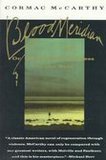Blood Meridian by Cormac McCarthy
 This is really an extraordinary novel. The language as so many have commented derives from Melville and Faulkner and, and like both, ultimately the language and the tone owe much to the King James Version of Bible. I find it interesting, though, that both Faulkner and Melville are writing about their own times, while McCarthy attempts to recreate a 19th century narrative, not only the setting in 1849 and the Biblical overtones but the preview of the events at the beginning of each chapter. Occasionally I run across a word that seemed anachronistic to me, but if so there’s not more than a word or two that breaks the illusion of a 19th century narrative.
This is really an extraordinary novel. The language as so many have commented derives from Melville and Faulkner and, and like both, ultimately the language and the tone owe much to the King James Version of Bible. I find it interesting, though, that both Faulkner and Melville are writing about their own times, while McCarthy attempts to recreate a 19th century narrative, not only the setting in 1849 and the Biblical overtones but the preview of the events at the beginning of each chapter. Occasionally I run across a word that seemed anachronistic to me, but if so there’s not more than a word or two that breaks the illusion of a 19th century narrative.The point of view of the narrative is fascinating. Who is it speaking? Many readers have reported putting this novel down because of the extreme violence—and it is violent, with gratuitous killing, mutilation, and absolutely no evidence that any character dwells much on the moral issues involved in killing. Yet the novel is not violent in the sense that a current movie or TV show is violent, because of the distance the narrator puts between the reader and the adventures befall the young boy who is at the center of the novel. The narrator reports what happens pretty dispassionately. I found myself having to reread a paragraph to makes sure that the atrocity I think happened really happened. The narrator reports what happens in the third person but he focuses exclusively on the group of men under Glanton who are hired to bring Indian scalps to various Mexican officials—mercenaries in every sense of the word, particularly on the one called only “the kid”, the boy from Tennessee who at 14 crosses by himself into Texas and eventually become part of Glanton’s group.
The debunking of romantic myths of the West is an obvious theme of the novel, but I’m puzzled at the end exactly why. In the novel, the Judge’s last speech sounds very much like sentiments that a New York Times book reviewed heard directly from McCarthy: As war becomes dishonored and its nobility called into question those honorable men who recognize the sanctity of blood will become excluded from the dance, which is the warrior’s right, and thereby will the dance become a false dance and the dancers false dancers. McCarthy is reported to have said the following to reporter Richard Woodward: There's no such thing as life without bloodshed. I think the notion that the species can be improved in some way, that everyone could live in harmony, is a really dangerous idea. Those who are afflicted with this notion are the first ones to give up their souls, their freedom. Your desire that it be that way will enslave you and make your life vacuous.


0 Comments:
Post a Comment
<< Home